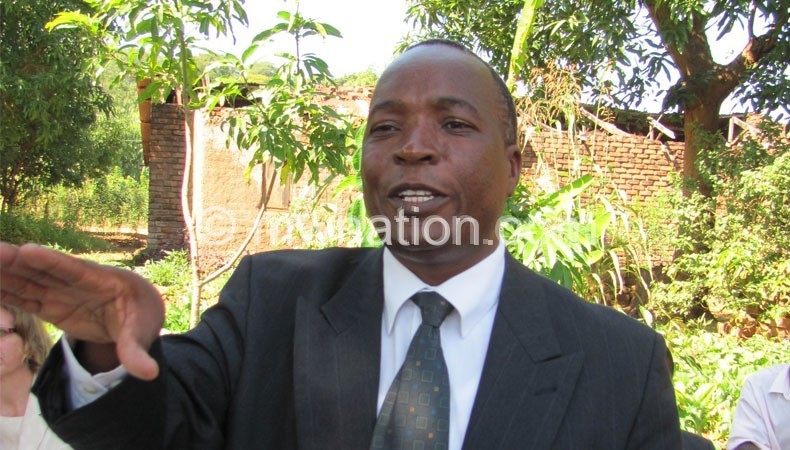‘One health is about containing diseases’
On June 23 this year, Professor John Chisi will be delivering an inaugural lecture on One Health at the University of Malawi’s College of Medicine (CoM) in Blantyre. EPHRAIM NYONDO talks to Prof. Chisi, in this interview, to find out more about him and his journey as researcher, practitioner and an academic.

In the first place, Professor, what is your background?
I am John Chisi, Professor of experimental pathology at the College of Medicine. My academic journey is a bit long. To cut it short, I attended St. Patricks Seminary in Rumphi up to 1984 and after that I was selected to study at Chancellor College (Chanco). I studied for two years then I got a scholarship in 1986 to study Biology at St. Andrews University in Scotland. I graduated with a degree in human anatomy. Then I went to University of London to do clinical medicine for two years. I returned to finish a year in Malawi and graduated as a medical doctor in 1993. I worked for two years at Kamuzu Central Hospital (KCH) in Lilongwe before I got another scholarship to pursue a doctorate degree at St. Andrews University. I completed a PhD in experimental pathology in 1999.
But who is an experimental pathologist?
An experimental pathologist is a scientist or medical doctor who is interested in evaluating the cause and progression of diseases in the body. So I am purely a researcher.
So how do you balance research, teaching and practicing?
You see, what happens in life is that when you have a calling to serve, you will always have time to serve. I am a teacher and I teach disease control and disease processes. I also teach disease anatomy at the university. But at the same time, knowing how our country fares in terms of financial stability, I have a private clinic in Blantyre where I offer clinical services. It has been my source of stability in addition to the salary that I get from government.
Let us get to the inaugural lecture. What are the issues in health that you want to share with the general public and why. Again, should the public care about it?
I have been doing research on sleeping sickness. It is really a disease of animals—they are the ones who carry it. But it is transmitted to humans by tsetse flies. What I have been doing is to create a network of medical doctors, vetenarians, scientists, tourists and agriculturalists to work together. This consortium is being managed right now with a secretariat in Lilongwe. What I have been doing is to detect the disease both in humans and tsetse flies so that I or the team can be able to control epidemics. So what I want is to prevent the disease by looking at the tsetse flies—to see if they have infection in them and how we can control the spread of sleeping sickness. So if you can look at tsetse flies and see how many are infected, you can predict if there can be an epidemic of human infection because people go to hospitals when they have been beaten by tsetse flies. In detecting the infection in tsetse flies, I have been using molecular techniques and DNA [deoxyribonucleic acid]. So I have isolated tsetse flies in our game reserves to find out how much are infected and I have also looked at people around game reserves and see how many are infected and then I have used that to create a surveillance system.
How big is the problem of sleeping sickness in the country?
It is a big problem if you are in endemic areas such as Kasungu, Rumphi and Nkhotakota. But since it is a disease that is restricted to areas where we have national parks and people who are reasonably poor, it is very difficult for us to find the statistics. But there is something interesting which we discovered in Liwonde. You see, despite having no case of sleeping sickness, individuals there have been exposed to sleeping sickness by parasites, but they are not sick. It is possible from them to develop a vaccine to treat sleeping sickness.
Through your academic journey, how do you rate the way we are faring as a country in training health personnel?
The systems are not as we would want them to be. We have a big challenge of human resource development. We have neglected this part. We seem not to have a vision on how we should progress in human capacity development. This is a challenge we should handle as a nation and see how best we can manage it. Our education system is not the way it used to be in the past. When I was a student, teaching and learning was quite conducive because we had most of the basic needs. We had laboratories, we had expatriate teachers and accommodation facilities were quite good.
Today, our education support for the students is not the best. It leaves a lot to be desired. The number of sudents has increased exponentially while the number of teachers has remained the same. There is a lot of pressure on the academic staff to perform at the highest level.
But in terms of research, on my side, it is working because I have managed to network with international experts and organisations.
What is inaugural lectures key message?
The key message is that when we work together in terms of different fields of health and agriculture, we can combat and prevent most disease progression. I will be talking about the concept of One Health—which is about containing diseases transmitted from animals to humans.
Lastly, who is Professor Chisi?
I was born on November 8 1965 in Bolero, Rumphi. I am the first born in the family of eight. I am married to a Germany national and together we have three children.





